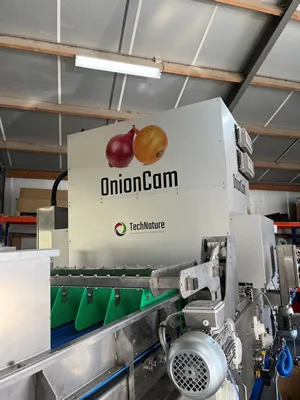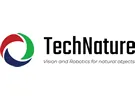 TechNature's optical sorting machines are making significant strides within the potato and onion sectors. The Dutch company recently installed an OnionCam at Roorda Ternaard, a cultivation and packaging company in the Netherlands.
TechNature's optical sorting machines are making significant strides within the potato and onion sectors. The Dutch company recently installed an OnionCam at Roorda Ternaard, a cultivation and packaging company in the Netherlands.
This relatively new onion market player packages onions for the Dutch supermarket chain Albert Heijn. "They can now easily sort out bare and weathered onions, thus saving significantly on labor and achieving an improved end product," begins TechNature's Wouter Bac.
TechNature originated from sorting Brussels sprouts with its SproutCam. This advanced camera system with image processing uses Deep Learning. By now, they have supplied much of that market.
And now, the company has started developing sorting solutions for other fresh produce. Currently, ten TechNature machines are running in seed potato and onion sorting, with ten more already sold. "The ratio is about 50/50." They have various dealers in different parts of the Netherlands.
For seed potato and onion sorting, the machines offer several advantages. "For instance, the PotatoCam and OnionCam have a minimal drop height, the machines come standard with two exits, and singulation is used for the benefit of side camera technology. The cameras see the potatoes and onions not only from the top but from the sides, too. As a result, many more flaws become apparent, especially with onions where many defects are at the root and the tail," Wouter explains. In seed potatoes, the second exit is used for optical size sorting, where a shock sorter corrects incorrect size sorting.
This video from Maatschap Hoeve de Hond in Dreischor shows 35 mm potatoes being sorted.
Singulation improves the view of the onions/potatoes' sides during rotation. The product is thus viewed all around, unlike machines with flat sorting rollers. The machine can also handle considerable volumes. The seed potato sorter, for example, has a 16 tons/hour capacity, and for onions, it is 25 tons per hour. "For such a compact machine, that capacity is unique. For Roorda, the investment offers many advantages. They can separate the bare and weathered onions and sell those to the peeling companies."
TechNature is adding something new - internal quality sorting - to its existing machines. "Thanks to our NIR experience, which we gained in products like melons and eggs, we can accelerate the development of this technology for onions," says Bac. "We've done many tests with very promising results. For instance, the machine effectively sorts out onions with fragile skins. Also, it's almost impossible to externally detect something like neck rot in onions, while internal sorting picks that up perfectly. In June, the first internal module will be installed on an OnionCam at [a local company] Ajuin."
The OnionCam and PotatoCam are also making their mark internationally, with the first machines sold in North America and Australia. "The global market offers enormous potential. With our internal and external defect detection and size sorting, we can keep going for quite some time," Wouter concludes.
 For more information:
For more information:
Wouter Bac
TechNature
36 Moerkapelse Zijde
2751 DL, Moerkapelle, The Netherlands
Tel.: +31 (0) 613 198 301
[email protected]
www.technature.nl
